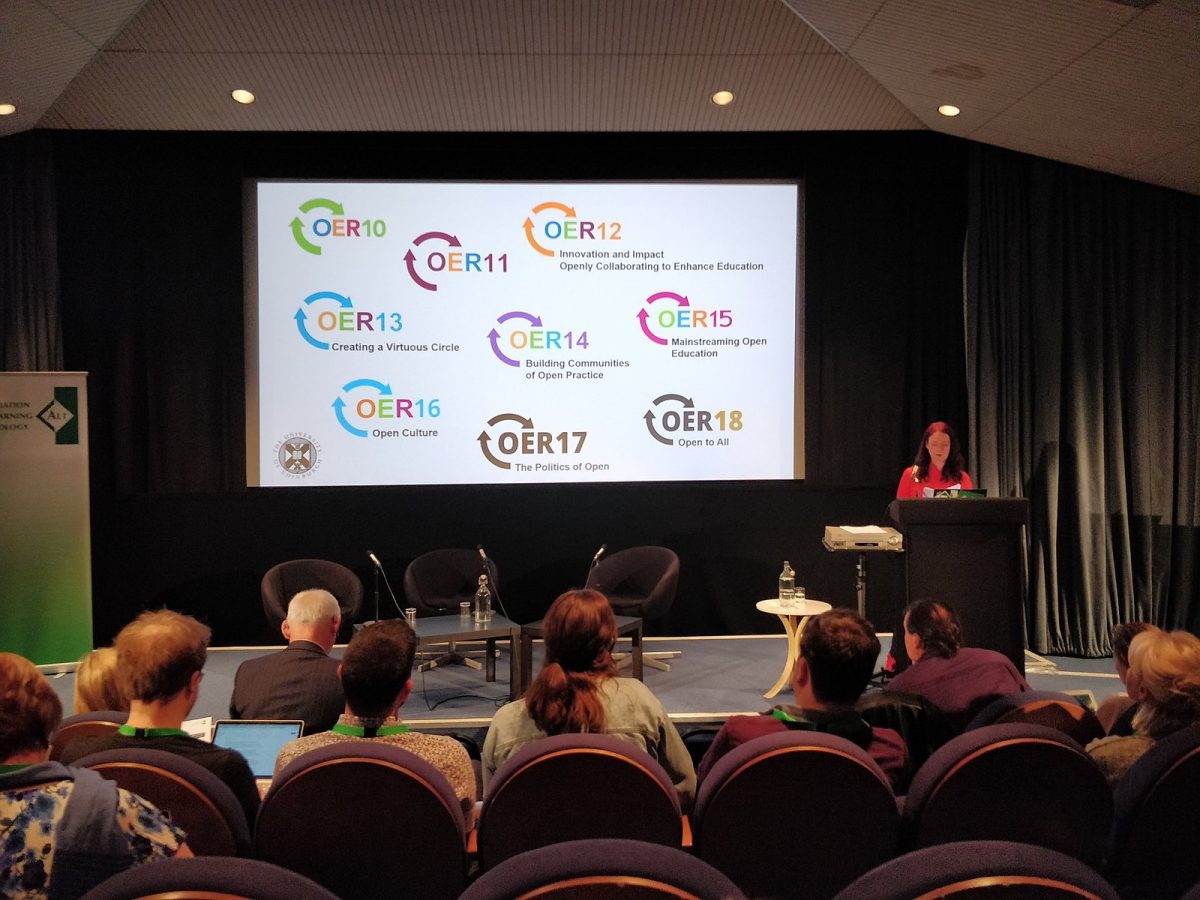
By Lorna M. Campbell, University of Edinburgh
Earlier this spring I was honoured to be invited to keynote at three open knowledge conferences in the UK and Ireland, which presented a great opportunity to highlight the work of the Wikimedia community to a wide and diverse audience.
The first event was the OER18 Open for All conference, which took place in Bristol in mid-April. Wikimedians have had a strong presence at the OER Conference since it was held at the University of Edinburgh in 2016, and this year was no exception. The conference, which now attracts delegates from across the world, featured no less than eight presentations and lightning talks focusing on different aspects of Wikimedia and education including Wikidata and the Semantic Web (Martin Poulter, WiR Bodleian Library), stories of Student empowerment and using Wikidata in the classroom (Ewan McAndrew, WiR University of Edinburgh), using Wicipedia as a platform to support Welsh language speakers and learners (Jason Evans, National Wikimedian, Wales) and using Wikipedia and Wikimedia Commons to support activism in cultural heritage (Anne-Marie Scott, University of Edinburgh).
I’ve been fortunate to attend every one of the OER Conferences since the event began in 2012 and my keynote focused on how the conference has examined and renegotiated what “OER” means over the years, I also looked at what we can do to ensure that open education is diverse, inclusive and participatory, and using examples of innovative initiatives from the University of Edinburgh, including the work of our Wikimedian in Residence, explored how we can engage students in open education practice and the co-creation of open education resources.
The following week I was at a very different event, the FLOSS UK Spring Conference in Edinburgh. The organising committee were keen to diversify both the scope and the gender balance of their event so I was invited to present a broad overview of the Open Knowledge landscape. It was also an the opportunity to highlight the problem of structural inequality and systemic bias in open communities, including Wikipedia and GitHub, and to highlight some of the positive steps Wikimedia is taking to tackle this problem, including the Wikimedians in Residence programme, and WikiProject Women in Red, and the success of Welsh language Wicipedia in being the first Wikipedia to achieve gender parity. I also highlighted the story of Open Knowledge advocate and Wikipedia editor Bassel Khartabil and the Memorial Fund that Creative Commons established to commemorate his legacy, because it demonstrates why it’s so important for all those of us who work in the broad domain of Open Knowledge to come together to break down the barriers that divide us.
In June I was in Galway for the CELT Symposium; not to be confused with the Celtic Knot Conference, which took place in Aberystwyth in July, the CELT Symposium is NUI Galway’s annual learning and teaching conference, and this year the theme was Design for Learning: Teaching and Learning Spaces in Higher Education. I was able to develop some of the themes I touched on at OER18 and FLOSS UK to look at what we mean when we talk about openness in relation to digital teaching and learning spaces, resources, communities and practices. I also explored the structural inequalities that prevent some groups and individuals from participating in open education and asked how open and equitable our open spaces really are, and who are they open to? Using innovative examples from our Wikimedian in Residence, I looked at how we can engage with students to co-create more equitable, inclusive and participatory open education spaces, communities and resources. It’s always a real privilege to be able to talk about our Wikipedia in the Classroom programme and to highlight the work that Ewan McAndrew has done to embed Wikipedia in a wide range of courses across the University of Edinburgh. Nobody communicates the value of Wikimedia in the classroom better than the students themselves so here’s Senior Honours Biology student Aine Kavanagh talking about her experience of writing a Wikipeda article as part of a classroom assignment in Reproductive Biology.
The title of my CELT talk, The Soul of Liberty – Openness, equality and co-creation, was paraphrased from a quote by Frances Wright, the Scottish feminist and social reformer, who was born in Dundee in 1795, but who rose to prominence in the United States as an abolitionist, a free thinker, and an advocate of women’s equality in education.
“Equality is the soul of liberty; there is, in fact, no liberty without it.”
The same could also be said of openness; equality is the soul of openness. If our open spaces and communities are not open to all equally, then really we have to question whether they are open at all. We need to identify the barriers that prevent some people from participating in the Wikimedia community, and we need to do what we can to remove these systemic obstructions. To me this is what openness is really about, the removal of systemic barriers and structural inequalities to provide opportunities to enable everyone to participate equitably, and on their own terms. And I believe this is why Wikimedia UK’s outreach activities and the work of our Wikimedians in Residence is so valuable, in helping to improve the coverage and esteem of Wikipedia articles about women and underrepresented minorities, and in redressing the gender imbalance of contributors by encouraging more women to become Wikimedia editors.
Links
OER18 – The Long View: Changing Perspectives on OER
FLOSS UK Spring Conference – Exploring the Open Knowledge Landscape
CELT Symposium – The Soul of Liberty: Openness, Equality and Co-Creation






